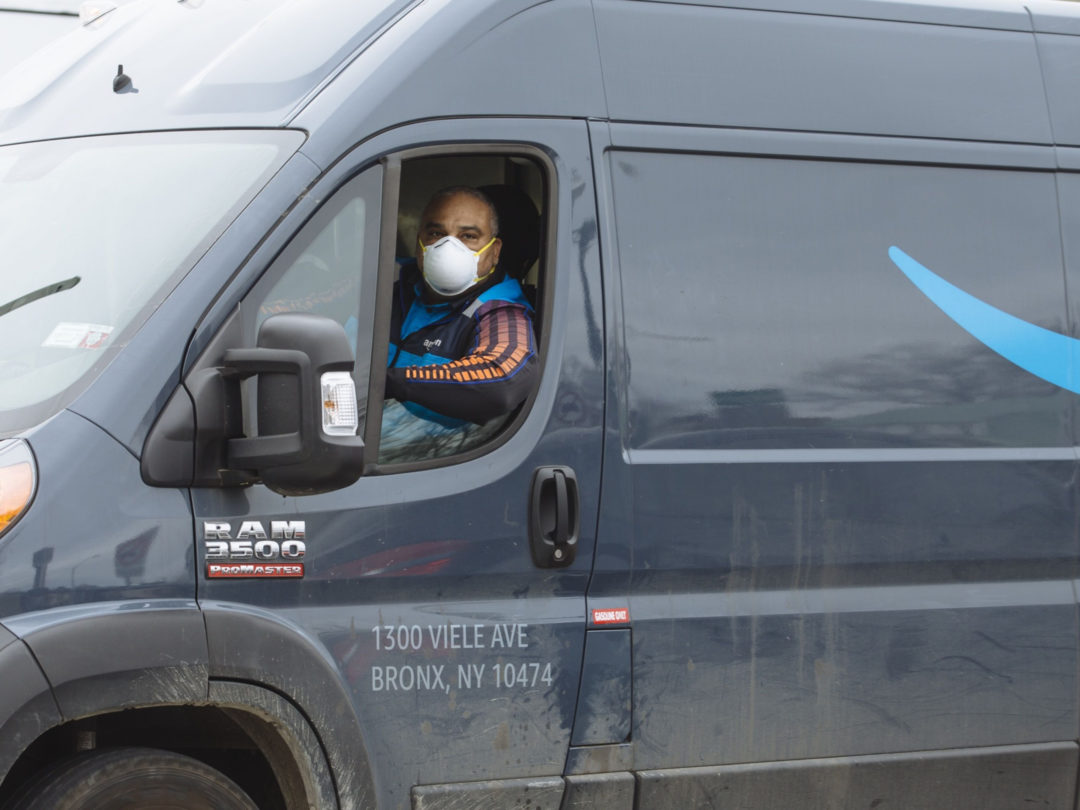
Visit Our Sponsors |
|
|
|
|
|
|
|
|
|
|
|
|
|
|
|
|
|
|
|
|
|
|
|
|
|
|
|
|
|
|
|
|
|
|
|
|
|
|
|
|

At least five workers at Amazon.com Inc. warehouses in Europe have contracted the coronavirus, a sobering development for a company already struggling to deal with a spike in orders for food and household essentials from customers hunkering down at home.
Cases of Covid-19, the disease caused by the coronavirus, have appeared at Amazon warehouses in Spain and Italy, two countries hard hit by the spreading disease. In both nations, the company has opted to keep the three facilities open, prompting criticism from unions that Amazon is putting sales ahead of worker safety; on Monday workers at Amazon’s main Italian logistics hub in Castel San Giovanni called for a strike.
Meanwhile in the U.S. the world’s largest online retailer is struggling to recruit enough people to pick, pack and deliver the surge in orders — and on Monday announced plans to hire 100,000 workers and raise pay in the U.S. and Canada by $2 an hour through April.
Amazon is caught in an uncomfortable vise: On one hand, the company is providing a lifeline — some would even say an essential service — to shoppers who would rather not brave their local supermarket or big-box store. On the other, keeping operations going risks the health and lives of the lowest-paid members of Amazon’s workforce, the warehouse workers and drivers who are unable to work from home like their corporate colleagues.
Amazon has to consider closing facilities and slowing the pace of deliveries to protect workers as well as its public image, said Alex Colvin, Dean of Cornell University’s School of Industrial and Labor Relations. “If a worker in an Amazon facility delivering groceries to people gets sick with Covid-19, that could really shake public confidence,” he said.
Those risks are already becoming clear. Late last month, an employee at the Castel San Giovanni facility tested positive for coronavirus, according to three people familiar with the matter. A second worker tested positive in the following days, said the people, who asked not to be named because the information isn’t public.
Marco Alquati, general secretary for the union Fisascat Cisl of Parma and Piacenza, said his organization had asked Amazon to close the building for two days for cleaning. “The company rejected the request as well as providing health masks for workers, so we called for a strike,” he said on Monday in a phone interview. Absenteeism at the facility has hit 30% in recent weeks because of virus fears, the people said.
In Spain, three employees at two warehouses — in Barcelona and near Madrid — tested positive for Covid-19, a local union representative told Bloomberg. The company told employees that the facilities would remain open, over the objection of labor groups. The cases were reported earlier by news site La Informacion.
“We are giving our support to the employees that are currently in quarantine,” Amazon said in an emailed statement in response to the Spain crisis. “The security and safety of our employees is our main concern and we are following the directives of the local and international health authorities, and we have applied a series of preventative health measures in our centers across the world.”
The company has offered two weeks of sick pay to workers diagnosed with the disease or placed in quarantine, and says warehouse employees can take unpaid time off through the end of the month without risk of termination. Amazon has also set up a $25 million fund to compensate staff and contractors facing hardships because of the pandemic.
Amazon has hundreds of warehouses, sortation centers and other logistics facilities across the U.S. Logistics consultants and former Amazon employees familiar with the network estimate that Amazon could weather the temporary closure of a building or two by automatically rerouting orders to other facilities. The company uses a version of that plan when facilities are overwhelmed with orders during the peak holiday shopping season, diverting them from the overburdened facility to others nearby until the backlog clears. Amazon has also used the system keep operations running during natural disasters such as flooding and tornadoes.
But several facilities going offline at once would be unprecedented, and could severely hamper Amazon’s ability to route orders around the U.S., the people say. In European countries where Amazon has fewer depots, the impact of a single closure in response to a coronavirus outbreak would be greater.
The coronavirus also comes at a time of year when Amazon is typically shedding — not adding — workers. In January, the company cut ties with the tens of thousands of temporary staff it had brought on in the run-up to the holiday season, leaving warehouses staffed for a period of relative calm, not a viral epidemic that caused a surge in demand for goods from canned food to toilet paper.
“You don’t design operations for this kind of thing, they just hit you,” said Marc Wulfraat, a logistics consultant who closely tracks Amazon’s network. “There’s definitely an unplanned spike happening. And the only way to handle that unplanned spike is more manpower.”
Far from shutting down, there are signs the company is frantically trying to hire more workers. Job listings in Amazon’s logistics and operations unit have more than tripled this month. Amazon has told delivery companies to be ready to shoulder an extended rise in demand. And the company is offering overtime and bonus pay in cities across the U.S. to entice people to deliver groceries. All told, Amazon plans to hire an additional 100,000 full-time and temporary staffers in the U.S., Dave Clark, Amazon’s logistics chief, said in a blog post on Monday. “We are seeing a significant increase in demand, which means our labor needs are unprecedented for this time of year.”
An Amazon delivery company in Texas recently told its drivers they should expect to have to work additional shifts over the next six weeks since many shoppers are ordering from Amazon rather than going to stores. Amazon’s own job postings point to a massive recruitment drive: The company on Monday had some 4,300 open positions in its fulfillment, transportation and logistics groups. A month ago, those units were seeking about 1,200 workers. One Amazon manager on the West Coast took to social media on Sunday to suggest service workers laid off because of government closures of stores and restaurants apply for those jobs.
Even as the company tries to hire more people, members of Amazon’s existing workforce are having second thoughts about reporting for work. One warehouse worker in the Midwest said she was taking advantage of Amazon’s offer of unpaid time off during the pandemic to care for kids whose schools had closed. Some of her friends at the facility were in the same situation. Others, she said, were spooked by reports of coronavirus cases in the county where the fulfillment center was located.
Amazon, the worker said, had posted signs reminding employees to wash their hands and set up extra hand sanitizer stations, but hadn’t taken steps such as screening employees on their way in or discouraging people from congregating in break rooms or the sometimes long lines to enter or exit the facility.
In Western Europe, trade unions are pressuring Amazon to curtail its activities to protect workers. Julien Vincent, a representative with the CFDT union who works at an Amazon warehouse in Montelimar, in the south of France, said the union had asked Amazon to cut the number of workers at its facilities. “For now they haven’t done anything,” Vincent said. “Things are continuing like things were normal.”
Alain Jeault, a representative of the CGT trade union, said Amazon added hundreds of temporary workers on Monday alone. “Unless I am mistaken, the government has said that only what is vital to the survival of the nation should be left open. I didn’t think that selling a CD, a book, a pair of shoes was so vital that it would put thousands of people in danger.”
Amazon units that do deliver essential items have been strained by the jump in demand.
Customers in major cities like Seattle, Los Angeles and New York have reported in the last two weeks that the Prime Now fast delivery program, which is designed to deliver orders in as little as one hour, has repeatedly showed no open delivery slots, an indication the company wasn’t able to entice enough drivers to keep up with demand. On Sunday, the company acknowledged a technical glitch that disrupted deliveries for Whole Foods and Prime Now service.
On-demand workers who take shifts to pick items at Whole Foods Market stores in dozens of stores were offered an extra $5 an hour if they worked on Monday, according to an email the company sent to its gig economy workers. Amazon also raised the weekly cap on hours for such workers — often set between 20 and 30 hours a week — to 60 hours.
The bonus and overtime pay wasn’t enough for one occasional Whole Foods picker in the Denver area, who cancelled a shift on Sunday out of concern that the company wasn’t doing enough to protect workers jostling for produce in aisles crowded with customers.
“They claim to care about their workers yet clearly not enough to rein in two-hour delivery expectations of the customers,” said the person, who spoke on the condition of anonymity. “Not enough to tell them to stay home, as the epidemiologists are urging.”
Whole Foods in a news release on Friday said the company had stepped up in-store sanitation protocols, including cleaning of workstations, and had relaxed rules around calling in sick.
Amazon also has little control over its delivery drivers, since many of them are independent contractors in their own vehicles or employees of separate delivery services working under contract with Amazon. Amazon issued advisories to Amazon Flex drivers, who make deliveries in their own vehicles, asking them to stay home if they've had a fever and to avoid personal contact like handshakes and hugs.
Some drivers have limited contact with customers if they are simply dropping packages off on doorsteps. But Amazon Flex drivers who deliver groceries and delivery drivers who bring packages to businesses and office buildings often interact with customers directly and come in close contact. Those drivers are monitoring coronavirus cases in their communities and assessing their risk from working on a day-to-day basis.
RELATED CONTENT
RELATED VIDEOS
Timely, incisive articles delivered directly to your inbox.



.jpg?height=100&t=1715228265&width=150)


